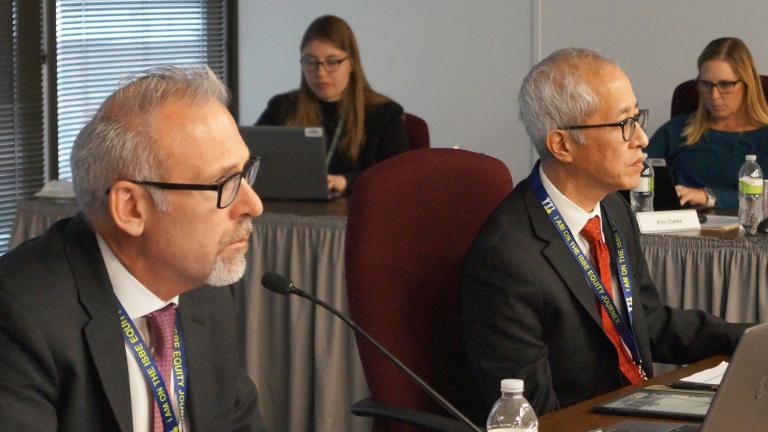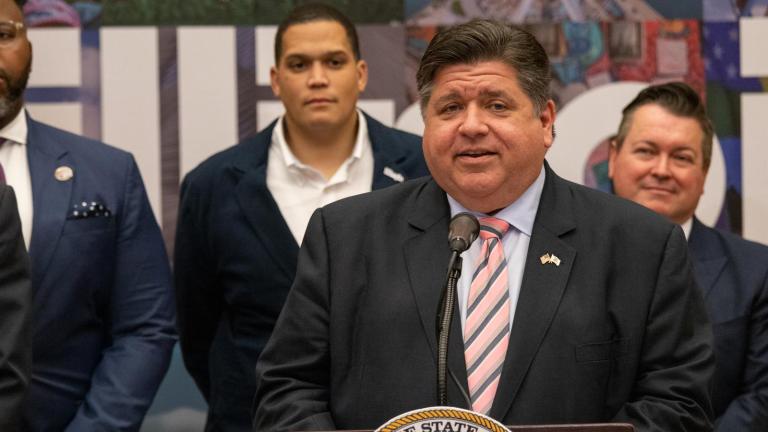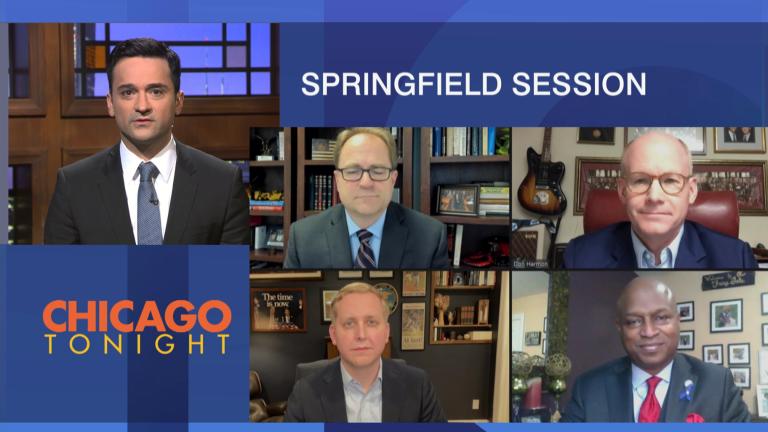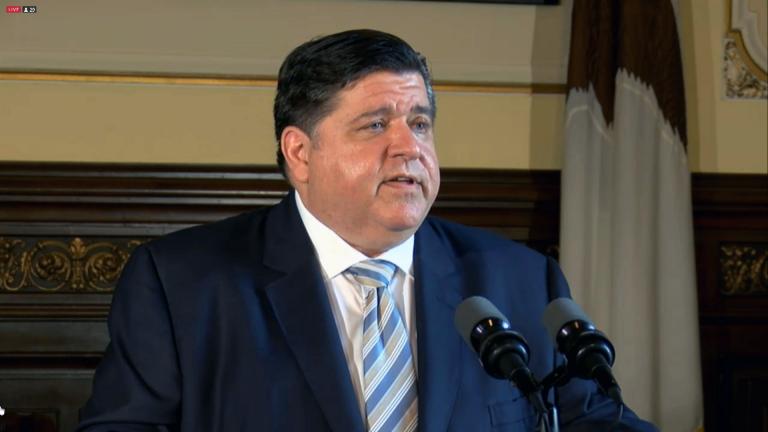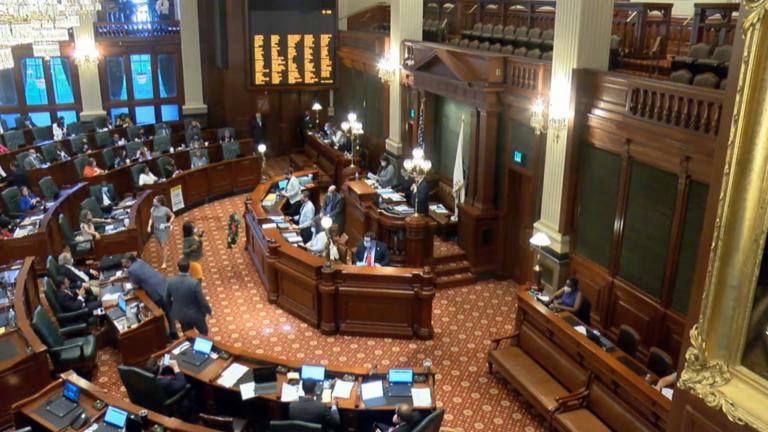 (Éovart Caçeir at English Wikipedia)
(Éovart Caçeir at English Wikipedia)
After two years of gamesmanship, gridlock and ever-deepening fiscal turmoil, Illinois saw a potential breakthrough Friday morning, when a $36.5 billion spending plan cleared a major hurdle in the Illinois House.
“Maybe we have turned a corner here today,” said Democrats’ lead on the budget, Rep. Greg Harris, D-Chicago.
The preliminary nature of the vote means Illinois missed the deadline and will begin a third year—fiscal year 2018—without a budget in place.
However, private meetings continue. Should they lead to a deal, the General Assembly will be in session Saturday to take action (the House will convene at 11 a.m., the Senate at 2 p.m.).
Dem. Greg Harris: "maybe we have turned a corner here today."
Every journey of 1,000 miles begins with one step. This is the step. pic.twitter.com/hRuV8zamNo— Amanda Vinicky (@AmandaVinicky) June 30, 2017
Friday’s vote (on an amendment to Senate Bill 6) served as a test, gauging whether Republicans would join with Democrats, who control the General Assembly, to approve a budget.
Twenty-three of the chamber’s 51 GOP representatives did.
“Now is the time to bring this nightmare to an end. Now is the time to stop quarreling and to start governing,” Rep. David Harris, R-Arlington Heights, said, prompting applause from Democrats.
While that falls short of the 30 Republican votes that Illinois House Speaker Michael Madigan recently said will be required to successfully pass the tax increase, and generate the necessary revenue to pay for that spending, the vote shows a path toward compromise.
Seventy-one votes are required for passage; Democrats hold just three seats short of that threshold in the House.
“I think it’s a good step forward, a step that we can build upon,” Madigan said following the vote. “There’s much work yet to be done.”
The next 24 hours will be crucial in sealing the state’s fate. The House action is seen as pivotal, given that the Senate in May—with only Democratic votes—already approved a budget and accompanying revenue package, and given the intense animus between Madigan and Gov. Bruce Rauner.
While a tax hike is always controversial, stakes are higher given both the gravity of Illinois’ financial distress, and the 2018 elections.
Illinois is already on track for record spending in the governor’s race; Republicans are also attempting to make dents in Democrats’ legislative majorities.
Though Rauner hasn’t weighed in on the proposal, House Minority Leader Jim Durkin’s “aye” vote can be viewed as a blessing—if not of the spending plan itself, of the vote’s serving as an entrée to further negotiations. Durkin called it a “good start” and a “gesture of good faith.”
“I am committed to getting the job done. That means a balanced budget. Responsible cuts. And reforms that are going to put Illinois back on track,” Durkin said. “Tensions have been very high. I understand it. And because of that, there has been a lack of good faith that has permeated this chamber of the past two years. Here’s my commitment: I am committing to vote for this amendment and I’m also committing to put Republican votes on this. Not just to get passage but to bring us past 71 and that to me is my commitment to you that we continue our work today. Because I’m telling you: We are close. We are so close I can taste it. But folks, bear with us.”
The Illinois House adjourned just after 2 p.m. Wednesday without taking any additional action on the budget, or the other controversial matters at the heart of the impasse, despite threats from multiple bond houses that Illinois will be the first state to ever have its credit rating downgraded to “junk” without a budget in place by July 1.
“In our view, the unrelenting political brinkmanship now poses a threat to the timely payment of the state’s core priority payments,” S&P analyst Gabriel Petek wrote in early June. “Illinois is now at risk of entering a negative credit spiral, where downgraded credit ratings would trigger contingent demands on state liquidity, further exacerbating its fiscal distress. Although CreditWatch typically has a 90-day time horizon, we anticipate resolving Illinois’ placement around the start of its 2018 fiscal year, which begins on July 1. If lawmakers fail to reach agreement on a budget with provisions designed to reduce the state’s structural deficit, it’s likely we will again lower the ratings.” Lawmakers may, however, have a short window of leeway given that the holiday weekend.
Following the budget vote, Madigan sent analysts at S&P, Moody’s and Fitch a letter asking that “in light of this ongoing progress, I would ask that your agency temporarily withhold judgment and allow legislators time to negotiate a bipartisan, balanced budget.”
“I am hopeful that the governor will recognize these compromises. I also hope your organization recognizes this work as a meaningful step,” he wrote.
Moody's has "no comment" on the letter. https://t.co/u2A3An8s7Y
— Amanda Vinicky (@AmandaVinicky) June 30, 2017
Madigan promised further negotiations with the other legislative leaders on taxes. There’s general agreement that a revenue package will include raising the personal income tax rate from 3.75 to 5 percent. Still up for debate is whether it would take effect starting in July, or whether it would be retroactive to January.
Rauner’s preconditions for a deal include reducing businesses’ workers’ compensation expenses, reducing the state’s pension costs, a freeze of local property taxes, and creating a path for local government consolidation.
In recent days, Madigan has added demands of his own. The longtime speaker says he wants the governor to sign an education funding formula (Senate Bill 1) despite Rauner’s claim that it’s a “bailout” for Chicago Public Schools. The speaker also says the governor must also halt an ongoing bid for new and lucrative Medicaid managed care contracts so that it can be subject to the state procurement code, and he wants Rauner to commit to a signing a law regulating the rates charged by workers’ compensation insurers.
Related: SB1124 vs. SB1: Which is Best for Funding Illinois Education?
If a deal isn’t wrapped up, consequences will be expensive and potentially catastrophic.
Social service agencies, contracted by the state to care for vulnerable populations, that have limped along without state funding will have to endure further strain; already many have laid off employees and reduced services.
Some Illinois universities, which haven’t received any money from the state in 2017, stand to lose their federal accreditation.
The state transportation department has told contractors that without an appropriation, they will have to stop all roadwork. Such a shutdown is projected to cost the state $25 million, and thousands of construction workers will be out paychecks.
The dynamics of leadership in Springfield will also change going forward.
Senate Republican Leader Christine Radogno is resigning from the Legislature on July 1.
The 22-member caucus announced that in a unanimous, private vote on Friday morning, Sen. Bill Brady of Bloomington—who was Republicans’ nominee for governor in 2010 but lost to Gov. Pat Quinn—was chosen as the next minority leader.
The switch won’t be made official until a floor vote in the Senate.
“There’s a lot of important things that we need to get done that we’ve laid on the table. It’s my hope, and prayer, frankly, that we can get that done in the next few hours, to provide the relief and a plan that the people of Illinois need,” Brady said, surrounded by Republican senators at the steps out a grand stair case in the capitol rotunda. “We know that Illinois needs a bipartisan solution. It needs a solution and we know that it has to be bipartisan.”
Brady, a real estate developer, served in the Illinois House from 1993-2001; he’s been a state senator since 2002.
Radogno, but not Brady, attended a roughly hourlong meeting with other legislative leaders midday Friday.
Rauner has also not been present at negotiating meetings.
![]()
Republicans who voted yes:
Andersson
Bennett
Bourne
Brady
Bryant
Butler
Cabello
Cavaletto
Costello
Davidsmeyer
Durkin
Fortner
Hammond
D. Harris
Hayes
Wojcicki Jimenez
Meier
Philips
Pritchard
Severin
Stewart
Unes
Welter
Follow Amanda Vinicky on Twitter: @AmandaVinicky
Related stories:
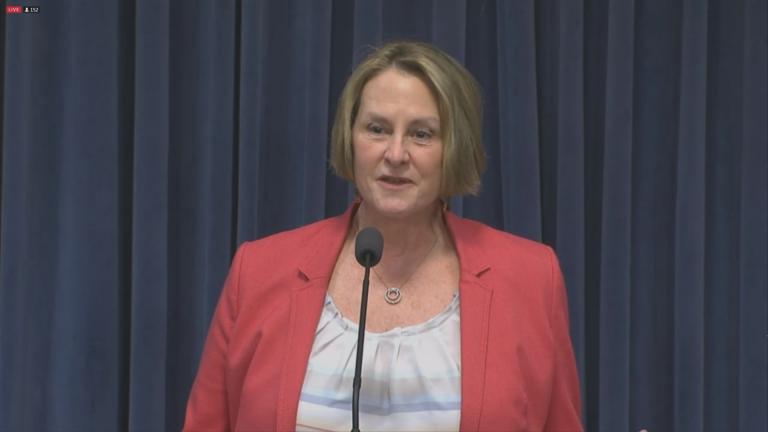 Radogno Resigns, Democrats Introduce Tax Plan
Radogno Resigns, Democrats Introduce Tax Plan
June 29: Two days before a Springfield special legislative session is scheduled to end, Illinois Senate Minority Leader Christine Radogno announced she will resign Saturday.
 Rauner Threatens to Prolong Special Session If There’s No Budget by Friday
Rauner Threatens to Prolong Special Session If There’s No Budget by Friday
June 28: In a statement released Wednesday, Gov. Bruce Rauner said he would prolong the special legislative session “if the legislature fails to send a balanced budget package to my desk by Friday.”
 Illinois House Democrats Propose Own Budget Plan
Illinois House Democrats Propose Own Budget Plan
June 27: Budget negotiations are ongoing in Springfield, with Friday's deadline edging ever closer.

